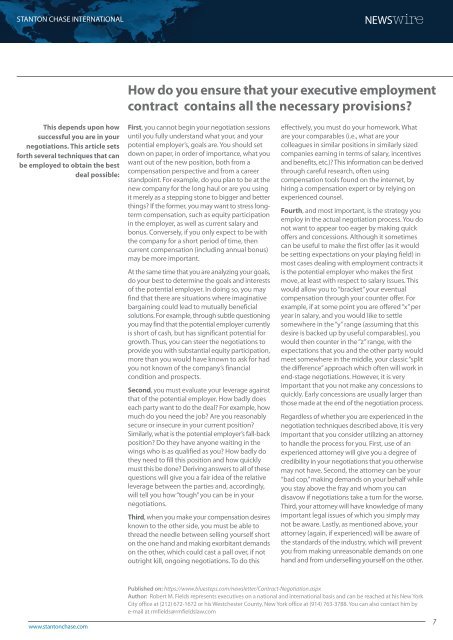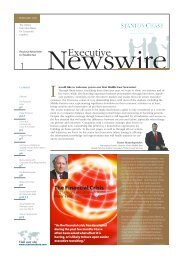Management Audit with Stanton Chase's Executive Assess ...
Management Audit with Stanton Chase's Executive Assess ...
Management Audit with Stanton Chase's Executive Assess ...
Create successful ePaper yourself
Turn your PDF publications into a flip-book with our unique Google optimized e-Paper software.
STANTON CHASE INTERNATIONAL<br />
This depends upon how<br />
successful you are in your<br />
negotiations. This article sets<br />
forth several techniques that can<br />
be employed to obtain the best<br />
deal possible:<br />
www.stantonchase.com<br />
How do you ensure that your executive employment<br />
contract contains all the necessary provisions?<br />
First, you cannot begin your negotiation sessions<br />
until you fully understand what your, and your<br />
potential employer’s, goals are. You should set<br />
down on paper, in order of importance, what you<br />
want out of the new position, both from a<br />
compensation perspective and from a career<br />
standpoint. For example, do you plan to be at the<br />
new company for the long haul or are you using<br />
it merely as a stepping stone to bigger and better<br />
things? If the former, you may want to stress longterm<br />
compensation, such as equity participation<br />
in the employer, as well as current salary and<br />
bonus. Conversely, if you only expect to be <strong>with</strong><br />
the company for a short period of time, then<br />
current compensation (including annual bonus)<br />
may be more important.<br />
At the same time that you are analyzing your goals,<br />
do your best to determine the goals and interests<br />
of the potential employer. In doing so, you may<br />
find that there are situations where imaginative<br />
bargaining could lead to mutually beneficial<br />
solutions. For example, through subtle questioning<br />
you may find that the potential employer currently<br />
is short of cash, but has significant potential for<br />
growth. Thus, you can steer the negotiations to<br />
provide you <strong>with</strong> substantial equity participation,<br />
more than you would have known to ask for had<br />
you not known of the company’s financial<br />
condition and prospects.<br />
Second, you must evaluate your leverage against<br />
that of the potential employer. How badly does<br />
each party want to do the deal? For example, how<br />
much do you need the job? Are you reasonably<br />
secure or insecure in your current position?<br />
Similarly, what is the potential employer’s fall-back<br />
position? Do they have anyone waiting in the<br />
wings who is as qualified as you? How badly do<br />
they need to fill this position and how quickly<br />
must this be done? Deriving answers to all of these<br />
questions will give you a fair idea of the relative<br />
leverage between the parties and, accordingly,<br />
will tell you how “tough” you can be in your<br />
negotiations.<br />
Third, when you make your compensation desires<br />
known to the other side, you must be able to<br />
thread the needle between selling yourself short<br />
on the one hand and making exorbitant demands<br />
on the other, which could cast a pall over, if not<br />
outright kill, ongoing negotiations. To do this<br />
effectively, you must do your homework. What<br />
are your comparables (i.e., what are your<br />
colleagues in similar positions in similarly sized<br />
companies earning in terms of salary, incentives<br />
and benefits, etc.)? This information can be derived<br />
through careful research, often using<br />
compensation tools found on the internet, by<br />
hiring a compensation expert or by relying on<br />
experienced counsel.<br />
Fourth, and most important, is the strategy you<br />
employ in the actual negotiation process. You do<br />
not want to appear too eager by making quick<br />
offers and concessions. Although it sometimes<br />
can be useful to make the first offer (as it would<br />
be setting expectations on your playing field) in<br />
most cases dealing <strong>with</strong> employment contracts it<br />
is the potential employer who makes the first<br />
move, at least <strong>with</strong> respect to salary issues. This<br />
would allow you to “bracket” your eventual<br />
compensation through your counter offer. For<br />
example, if at some point you are offered “x” per<br />
year in salary, and you would like to settle<br />
somewhere in the “y” range (assuming that this<br />
desire is backed up by useful comparables), you<br />
would then counter in the “z” range, <strong>with</strong> the<br />
expectations that you and the other party would<br />
meet somewhere in the middle, your classic “split<br />
the difference” approach which often will work in<br />
end-stage negotiations. However, it is very<br />
important that you not make any concessions to<br />
quickly. Early concessions are usually larger than<br />
those made at the end of the negotiation process.<br />
Regardless of whether you are experienced in the<br />
negotiation techniques described above, it is very<br />
important that you consider utilizing an attorney<br />
to handle the process for you. First, use of an<br />
experienced attorney will give you a degree of<br />
credibility in your negotiations that you otherwise<br />
may not have. Second, the attorney can be your<br />
“bad cop,” making demands on your behalf while<br />
you stay above the fray and whom you can<br />
disavow if negotiations take a turn for the worse.<br />
Third, your attorney will have knowledge of many<br />
important legal issues of which you simply may<br />
not be aware. Lastly, as mentioned above, your<br />
attorney (again, if experienced) will be aware of<br />
the standards of the industry, which will prevent<br />
you from making unreasonable demands on one<br />
hand and from underselling yourself on the other.<br />
Published on: https://www.bluesteps.com/newsletter/Contract-Negotiation.aspx<br />
Author: Robert M. Fields represents executives on a national and international basis and can be reached at his New York<br />
City office at (212) 672-1672 or his Westchester County, New York office at (914) 763-3788. You can also contact him by<br />
e-mail at rmfields@rmfieldslaw.com<br />
7












